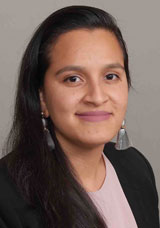
WHEP Scholar Estefania Alba-Rodriguez
Drexel University College of Medicine, Class of 2021
As women age, particularly after 35, their likelihood of pregnancy or live birth decreases. This is in part due to the decrease in number and quality of their oocytes, named ovarian reserve. However, the process of ovarian aging does not occur at the same rate in all women; it is accelerated in some women resulting in diminished ovarian reserve.
Current modalities to identify women with diminished ovarian reserve rely on follicle stimulating hormone (FSH), anti-Müllerian hormone (AMH) and estradiol levels as surrogate markers. There is no test that preemptively identifies women with a predisposition to diminished ovarian reserve. Knowing one’s fertility potential is imperative when making anticipatory family planning decisions.
Prior murine studies by the Berkowitz lab have demonstrated that female mice lacking Chtf18 are subfertile and have fewer ovarian follicles. These studies demonstrate a phenotypic similarity between the mice and that of women with diminished ovarian reserve. We speculate that Chtf18 human ortholog and variants are powerful indicators of diminished ovarian reserve. Our aim is to identify genetic biomarkers that can be used to predict ovarian reserve in women. My role in this study was to recruit patient volunteers, perform DNA extractions from blood samples and analyze preliminary data.
I was delighted to share some of our preliminary findings at the Helen I. Moorehead-Laurencin, MD, Sex and Gender Research Forum on March 13, 2019. The research study is ongoing; it was temporarily halted due to the closure of Hahnemann Univesrity Hospital. As we move toward subspecialized and individualized medicine, genetics are predicted to play a major in how we approach medical decisions and management. As rising physicians, it is imperative that we develop a strong foundation in basic science and clinical research in order to make significant contributions to better the care of our patients.